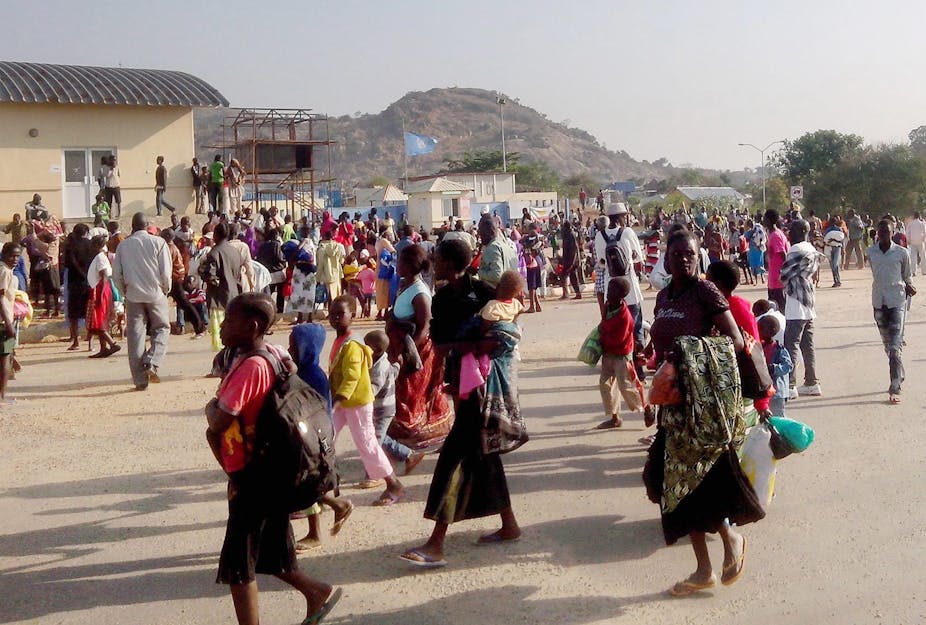The recent civil conflict in South Sudan, which has led to the deaths and injury of thousands of people, rising tension between tribal groups and political instability, might at first instance appear far removed from Australia. Yet with one of the largest South Sudanese diasporas in the world, there are many Australians – including those of South Sudanese descent – who have watched the spiralling violence with concern, worry and dread.
It was only in 2005 that the world watched with jubilation as south Sudan signed the Comprehensive Peace Agreement with north Sudan after decades of civil conflict. Then, in 2011, the Republic of South Sudan was formed after its people overwhelmingly supported a referendum for Independence from the north. So what has happened in this relatively short time frame?
Rather than grand narratives of another Rwanda or yet another African nation at war, one must pay attention to the specific situation in South Sudan. The concept and identity of South Sudanese were forged during decades of civil war against the north.
However, the war did not displace the very strong tribal identities and allegiances that existed long before the label “South Sudanese” did. Maps such as the one produced by the United Nations illustrate not only how closely ethnic groups or tribes are associated with land, but also that they were vital to notions of identity.
So while leaders such as the late John Garang, founder of the Sudan People’s Liberation Army/Movement (SPLA/M), tried to establish a vision of a New Sudan, his untimely death in 2005 meant his project was left unfinished.
Although South Sudan has made many strides as an independent nation amidst all the efforts to achieve peace, there has been very little focus on justice amongst South Sudanese. This includes dealing with atrocities that occurred during the civil war amongst different ethnic groups and tensions between two of the largest tribal groups, the Dinka and Nuer.
There has been no comparable process to South Africa’s Truth and Reconciliation Commission, set up after the end of apartheid, where grievances can be aired and past wrongs can be addressed.
For a long time the South Sudanese have also been united against their common enemy – the north. However, as that threat appears to diminish with Sudan dealing with its own protests, the cracks within South Sudan have started to appear.
These cracks include political tensions that led to the sacking of vice-president Riek Machar (who has past links to the government in Sudan) in July 2013, ongoing anger about corruption, concern about the pace of development and a worrying lack of media freedom. As others have noted, it is the combination of politics and ethnicity that has contributed to the current situation.
Countries such as the United States and Australia have been strong supporters of South Sudan. They are also two of the countries that provided resettlement opportunities for thousands of South Sudanese refugees who were displaced in neighbouring countries, including Kenya and Egypt.
Evidence of Australia’s sizeable South Sudanese community is present in the voting figures for the 2011 South Sudan referendum: 9202 South Sudanese-Australians voted in the referendum, the largest voting figures for any country outside of Africa.

Diasporas like the South Sudanese in Australia have played, and continue to play, an important role in their country of origin’s development. They raise awareness about their country of origin locally in Australia and even use the skills they have acquired in Australia to assist with South Sudan’s peace and development.
A 2011 parliamentary inquiry into Australia’s relationship with African countries noted that Australians of African backgrounds have a unique role to play in raising awareness about human rights issues in African nations. Many have set up NGOs to help rebuild their local communities and foster peace initiatives, with support and funding from the Australian government, Australian NGOs and churches and humanitarian agencies.
The recent federal government decision to cut the aid budget and merge AusAID with DFAT could badly hit such important projects. It also signals a step in the wrong direction for Australia’s relationship with the countries of Africa, especially when Australia has a seat on the UN Security Council.
Peace was hard-fought in South Sudan and came at a heavy price, not only for the development of the nation but also the long-lasting effect it has had on its people. Many of those people are now living in Australia and they too have helped South Sudan to achieve self-determination through their ongoing efforts.
Australia has recently sent military aircraft to South Sudan and could further assist the country by harnessing the potential of its South Sudanese diaspora. This requires a determination to maintain an aid budget, fund diaspora programs and re-engage politically with the countries of Africa.
Having come so far on its path to peace, no one wants to see South Sudan become deeply divided internally – least of all Australia’s South Sudanese community and its many supporters.

